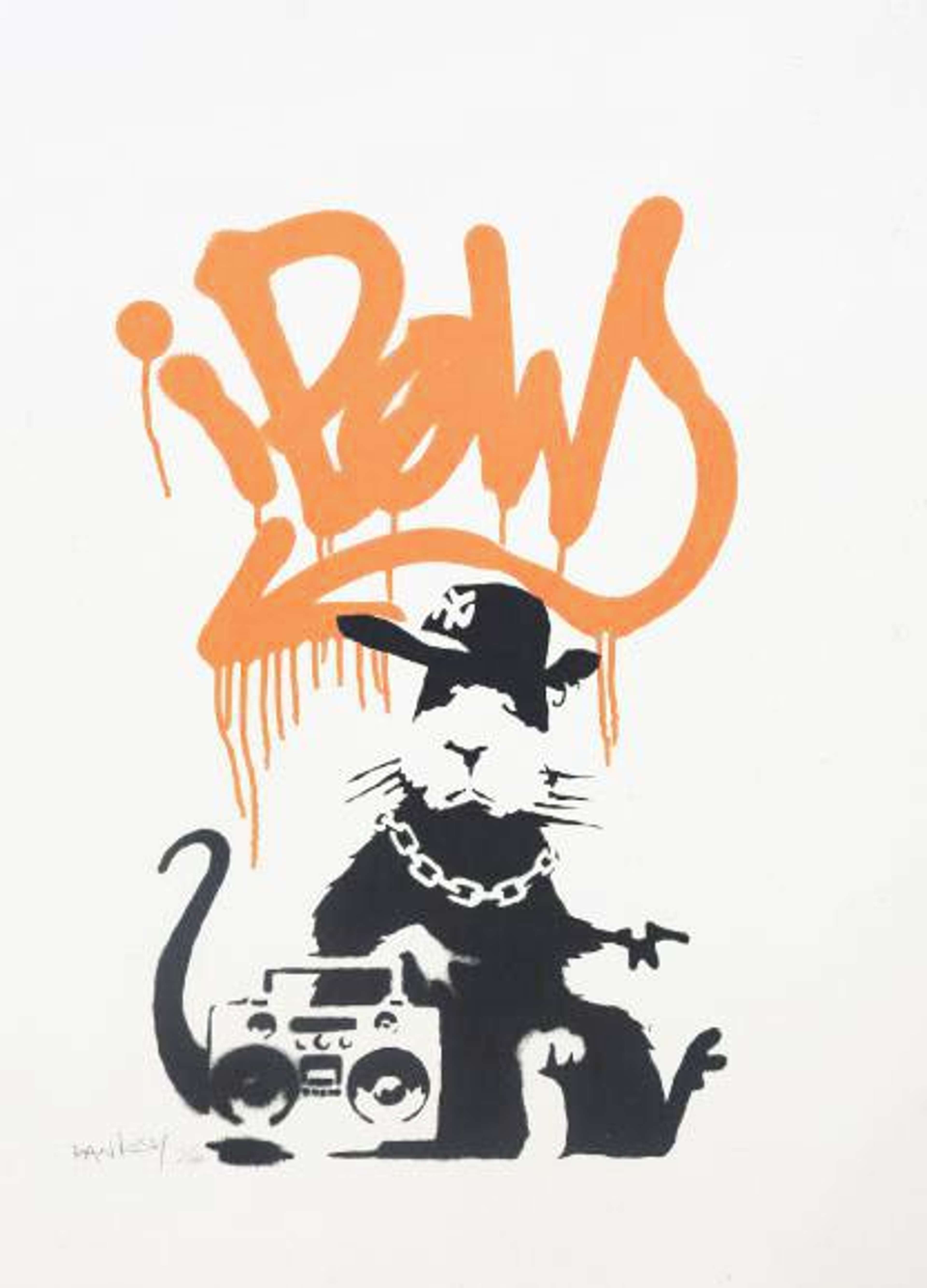 Gangsta Rat © Banksy 2004
Gangsta Rat © Banksy 2004
Banksy
270 works
Taking on any and all forms across Banksy's prints, the rat is a staple of the artist's ouvre.
To learn more about just why Banksy uses this motif, see our 10 facts here:
Why does Banksy use rats in his artwork?
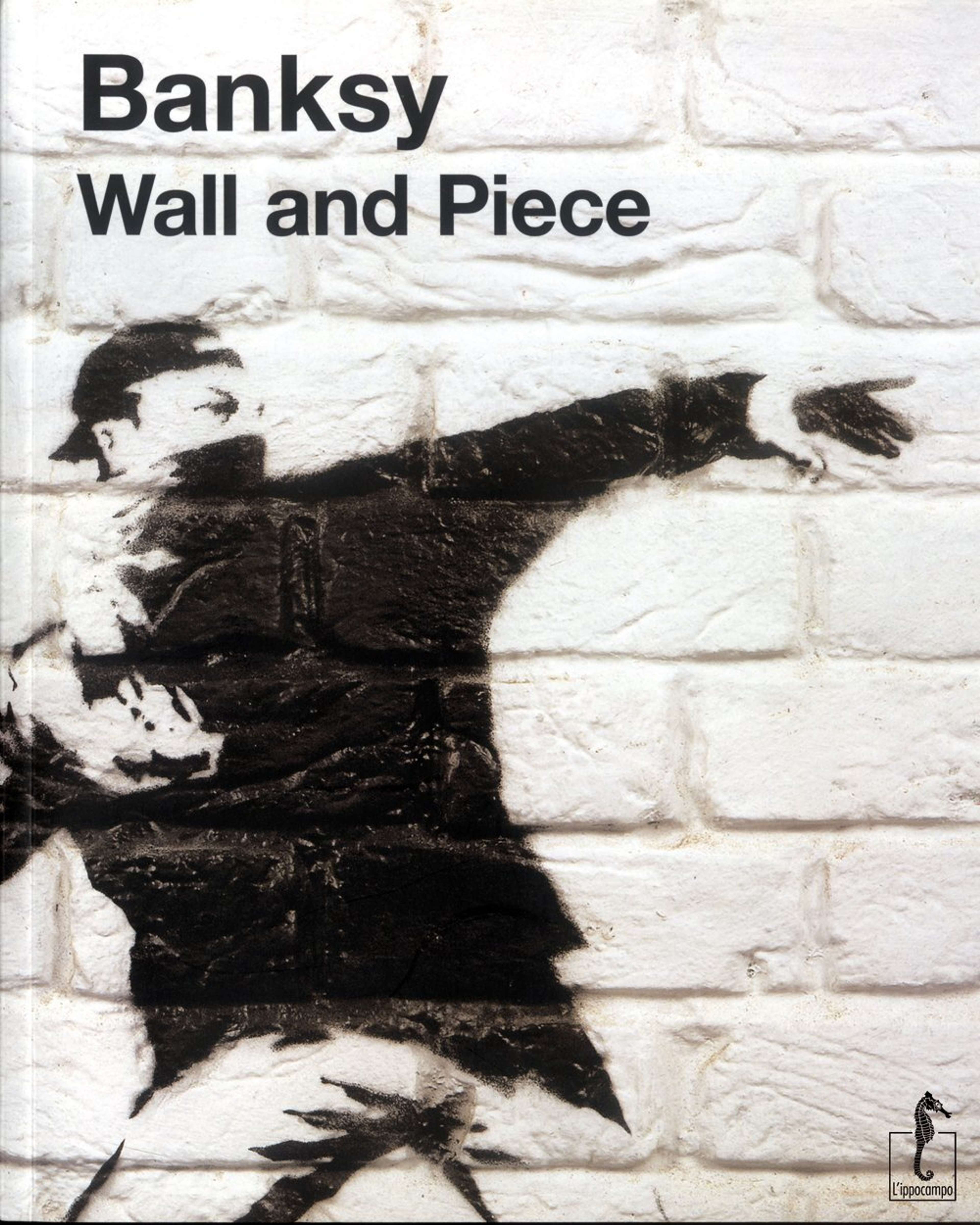 Wall and Piece © Banksy 2005
Wall and Piece © Banksy 2005Rats are at the heart of Banksy's art, so much so that some have speculated about the fact that 'rat' is an anagram of 'art.' While this sort of visual-verbal wordplay is certainly a key part of street art, Banksy wrote in his book, Wall and Piece: “I’d been painting rats for three years before someone said ‘that’s clever, it’s an anagram of art’ and I had to pretend I’d known that all along.”
For Banksy, each rat brings his political and social commentary to life – they present street artists, rebels, the downtrodden masses and anyone who feels rejected by society. On another page from Wall and Piece, the artist wrote:
“Rats exist without permission. They are hated, hunted and persecuted. They live in quiet desperation amongst the filth. And yet they are capable of bringing entire civilisations to their knees. If you are dirty, insignificant and unloved then rats are the ultimate role model."
It could be significant, given this, that while we have seen Banksy rat prints, and Banksy rat grafitti, we haven't yet seen an original Banksy artwork (beyond the street setting) featuring rats. They are the embodiment of the street artist's 'plague on the state' in their dissemination as well as their design. This must be why Banksy's stencilled street rats have popped up almost everywhere that the artist has visited over for many years. Today in London, rats can still be found on Tooley Street and Chiswell Street.
Find more London Banksy murals to visit here.
Banksy’s Love Rat was the first rat made into a print
 Love Rat © Banksy 2004
Love Rat © Banksy 2004Love Rat originally appeared as a mural on the streets of Liverpool. It was released as a print in 2004, making it the first Banksy rat for sale as a print, in 150 signed and 600 unsigned editions. At first, it appears that Love Rat was intended to spread love, but the bleeding heart may be a reminder that love can cause pain and suffering, as well as joy. Banksy even promoted this idea, suggesting a Love Rat print is “ideal for a cheating spouse”.
Banksy’s Gangsta Rat has the most colour variations
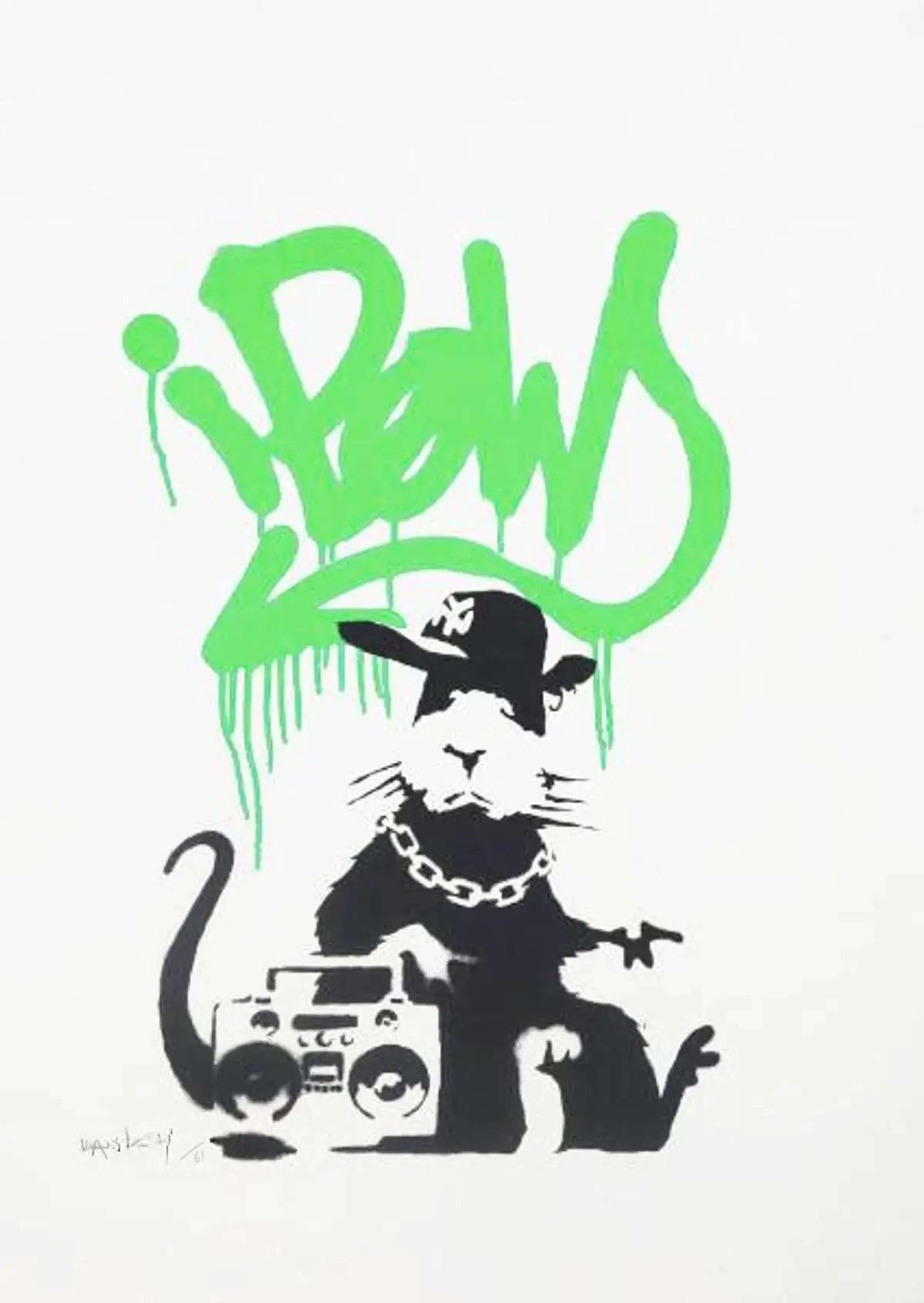 Gangsta Rat (AP Green) © Banksy 2004
Gangsta Rat (AP Green) © Banksy 2004Of Banksy's rats that have made it into print, Gangsta Rat, has the most colour variations, with 7 different versions available.
Gangsta Rat, wearing a New York Mets baseball cap, a chain necklace and a boom box, is a homage to the urban art and music scene that was fashionable in the UK in the 1980s and 1990s. The tag behind it, ‘iPOW’, references Apple’s i-products, but POW stands for Banksy’s older printers, Pictures on Walls. The artwork originally appeared as a mural in London in 2004. Later that same year, Banksy released Gangsta Rat with a red ‘iPOW’ as 150 signed and 350 unsigned prints. In 2015, he re-released the print in six additional colourways, including pink, mint green, green, orange, blue and grey for special Dismaland VIP collectors.
Radar Rat is one of Banksy’s rarest rats
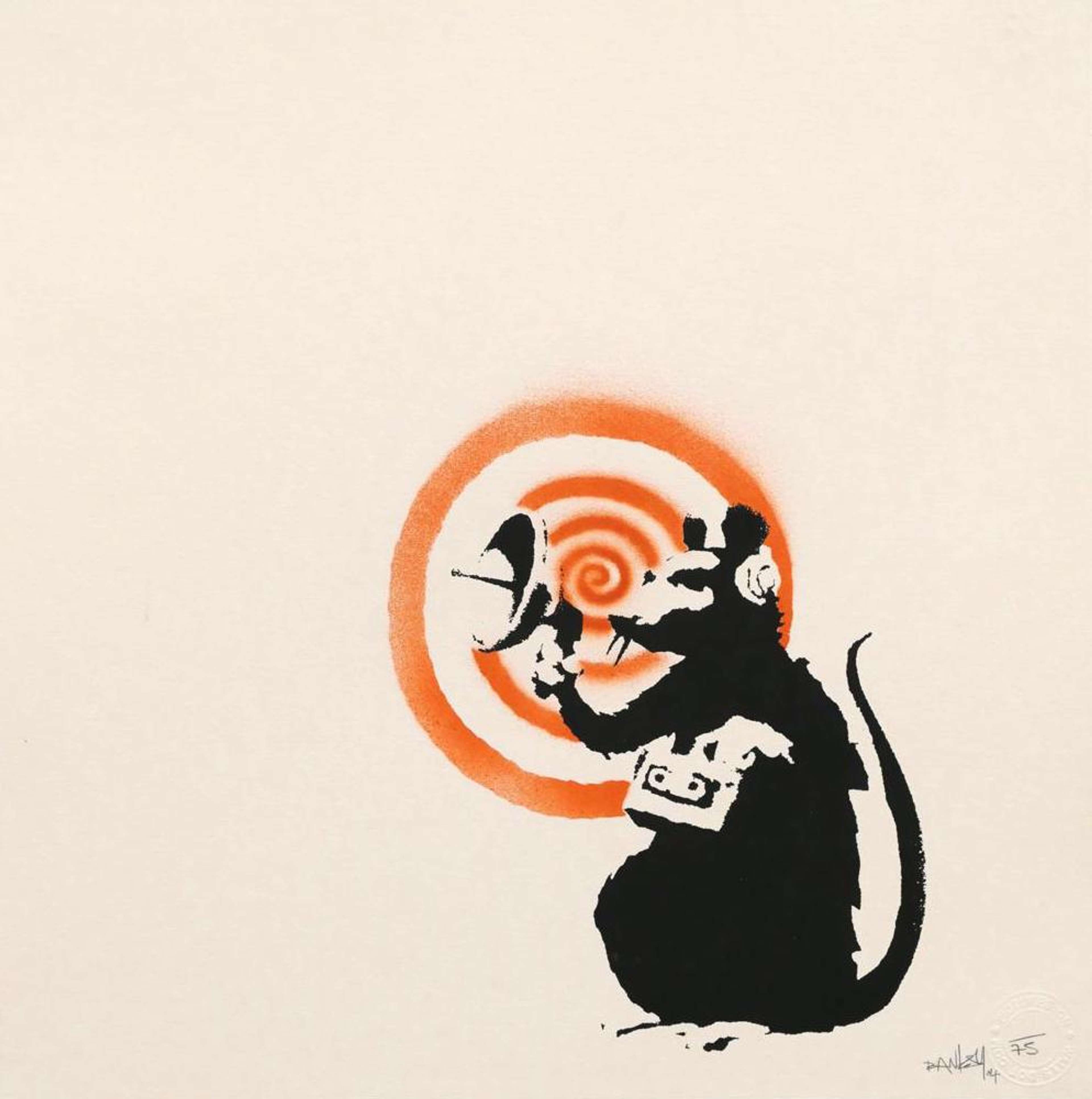 Radar Rat © Banksy 2004
Radar Rat © Banksy 2004Radar Rat originally appeared on the walls around London in 2002. It was later released as a print under the title Sonic Rat at Banksy’s ‘Santa’s Ghetto‘ pop-up shop. Only 75 signed prints were created, making Radar Rat one of Banksy’s rarest rat prints – excluding the special colour variations for Gangsta Rat. In 2008, Radar Rat featured on the cover of Dirty Funker’s music album Future. The 12" vinyl was released in 5 colour variations, each a limited edition, the rarest being a rat with a pink radar on a white backround.
In Radar Rat, the rat is standing on its hind legs, listening to the world through its headphones – a nod to the ever-growing surveillance state. But for Banksy, rodents are resourceful and rebellious. Radar Rat could be using the same surveillance techniques for survival or revolution. As Banksy once wrote, “Rats are the triumph of the little people, the undesirables and the unloved. They are the ultimate role model. Despite the best efforts of the authorities, they have survived, flourished and brought entire civilisations to their knees.”
Banksy’s Placard Rats are activists
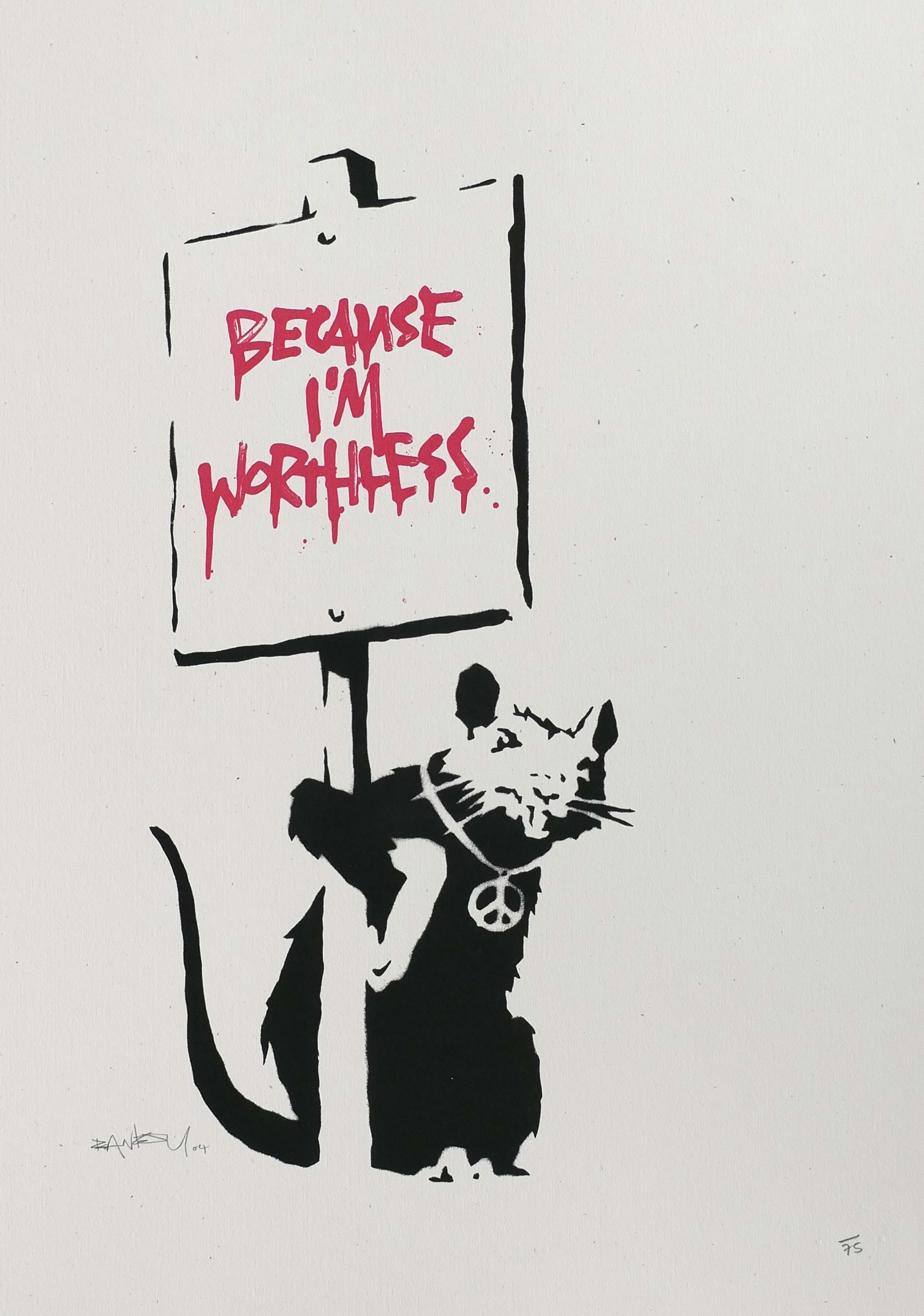 Because I'm Worthless © Banksy 2004
Because I'm Worthless © Banksy 2004There are three individual rats in Banksy’s Placard Rats series: Get Out While You Can, Welcome To Hell, and Because I’m Worthless. In each piece, a stencilled rat wearing a peace sign necklace protests against the corporate rat race. The 'Because I’m Worthless' slogan is a deliberate subversion of cosmetic brand L’Oréal’s ‘Because I’m Worth It’ tagline, representing a cog in the machine, worthless in the eyes of money-making corporations.
Meanwhile, Banksy’s Get Out While You Can takes its slogan from George Marshall’s book, Get Out While You Can – Escape The Rat Race. Welcome to Hell is, likewise, a tongue-in-cheek response to the corporate world. Banksy’s Placard Rats were released in 2004, with 75 signed and 175 unsigned prints each.
Did Banksy steal his rats from Blek le Rat?
 Image © Christies / Man Who Walks Through Walls © Blek le Rat 2007
Image © Christies / Man Who Walks Through Walls © Blek le Rat 2007Many of Banksy’s rat artworks were influenced by pioneering French graffiti artist Xavier Prou, better known as Blek le Rat, who is considered to be the ‘Father of Stencil Graffiti’ and whose rats has appeared around Paris since the 1980s. Banksy has acknowledged Prou as an inspiration, saying “Every time I think I’ve painted something slightly original, I find out that Blek le Rat has done it as well, only 20 years earlier.”
In return, Prou has said of Banksy: “People say he copies me, but I don’t think so… I feel what he is doing in London is similar to the rock movement in the Sixties.”
Banksy released live rats in his Crude Oils exhibition
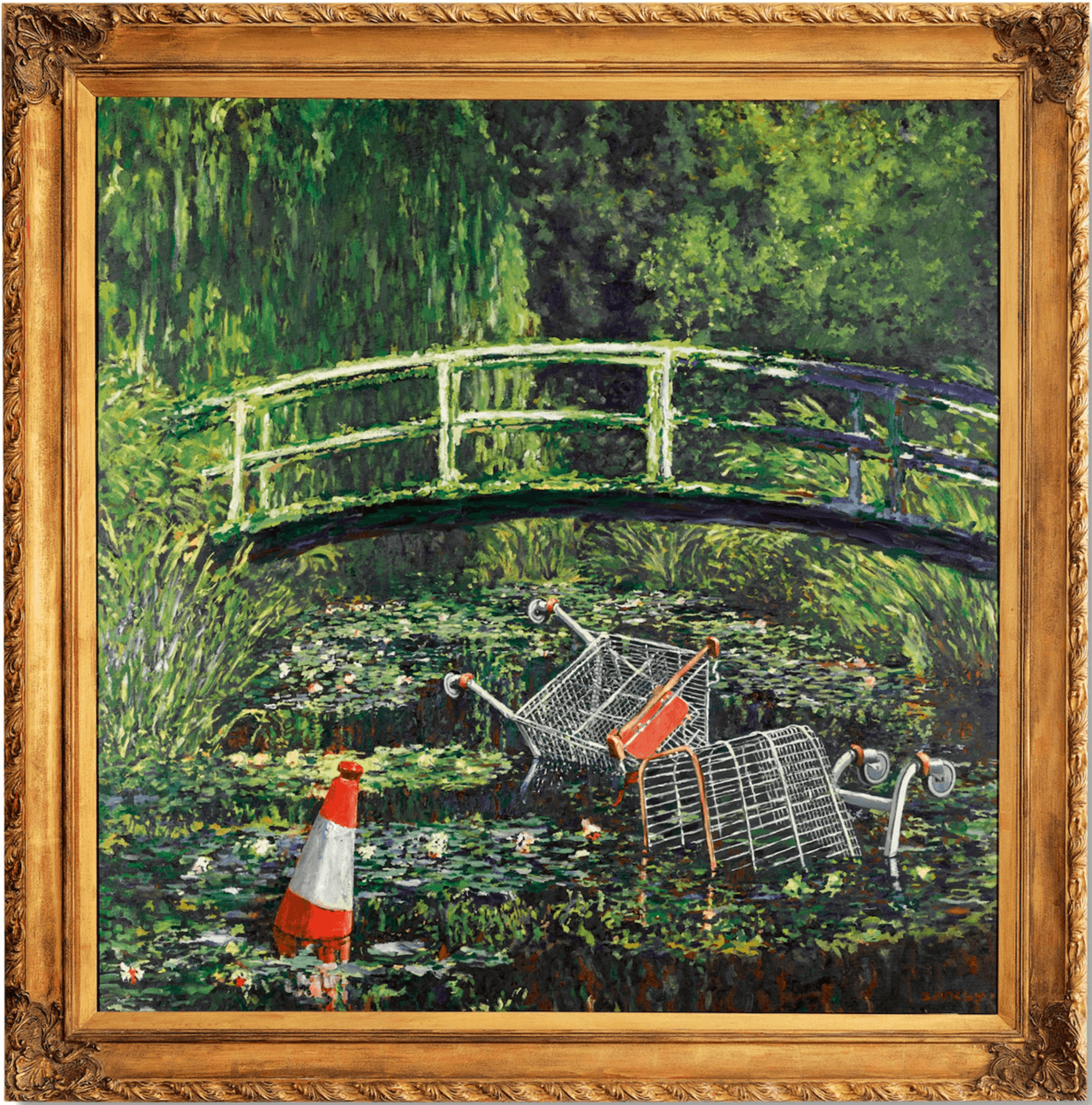 Image © Sotheby's / Show Me The Monet © Banksy 2005
Image © Sotheby's / Show Me The Monet © Banksy 2005The artist released close to 200 live rats into the gallery at his infamous 2004 exhibition Crude Oils in London, the show that unveiled record-breaking paintings such as Show Me The Monet. The event was marketed as a “gallery of re-mixed masterpieces, vandalism, and vermin.” Despite the concerns of collectors in attendance, environmental health officers declared that the space was safe and above board.
Banksy’s has dealt with his own rat infestation at home…
 Rats Bathroom Installation © Bansky 2020
Rats Bathroom Installation © Bansky 2020Banksy created a rat-themed artwork in his own home during the first lockdown. Never one to miss an opportunity to make a witty comment on the state of the world, Banksy transformed his bathroom into a work of art in April 2020, during England’s first lockdown. He stencilled mischievous rats causing havoc around the room – bringing to life both his frustration, shared by the public, of being stuck at home, as well as how lockdown had encouraged many to turn to creative pursuits to entertain themselves. Banksy posted photos of the installation on his Instagram with the caption “My wife hates it when I work from home.”
Banksy’s rats took over a London tube carriage
 Get Out While You Can © Banksy 2004
Get Out While You Can © Banksy 2004In July 2020, Banksy created a second piece of pandemic-inspired art titled If You Don’t Mask, You Don’t Get in a London Underground tube carriage. Disguised as a member of the Transport for London (TFL) cleaning team, the artist stencilled the walls and windows of the carriage with rats sneezing and playing with their face masks.
The work was seen by some as a statement on the risk of spreading the virus on public transport. In an ironic twist, the mural was accidentally destroyed by one of TFL’s genuine cleaners. Our lead Banksy broker and co-founder Joe Syer estimated the mural was worth in the region of £7.5million at the time.
Banksy’s rats can sell for six-figure sums at auction
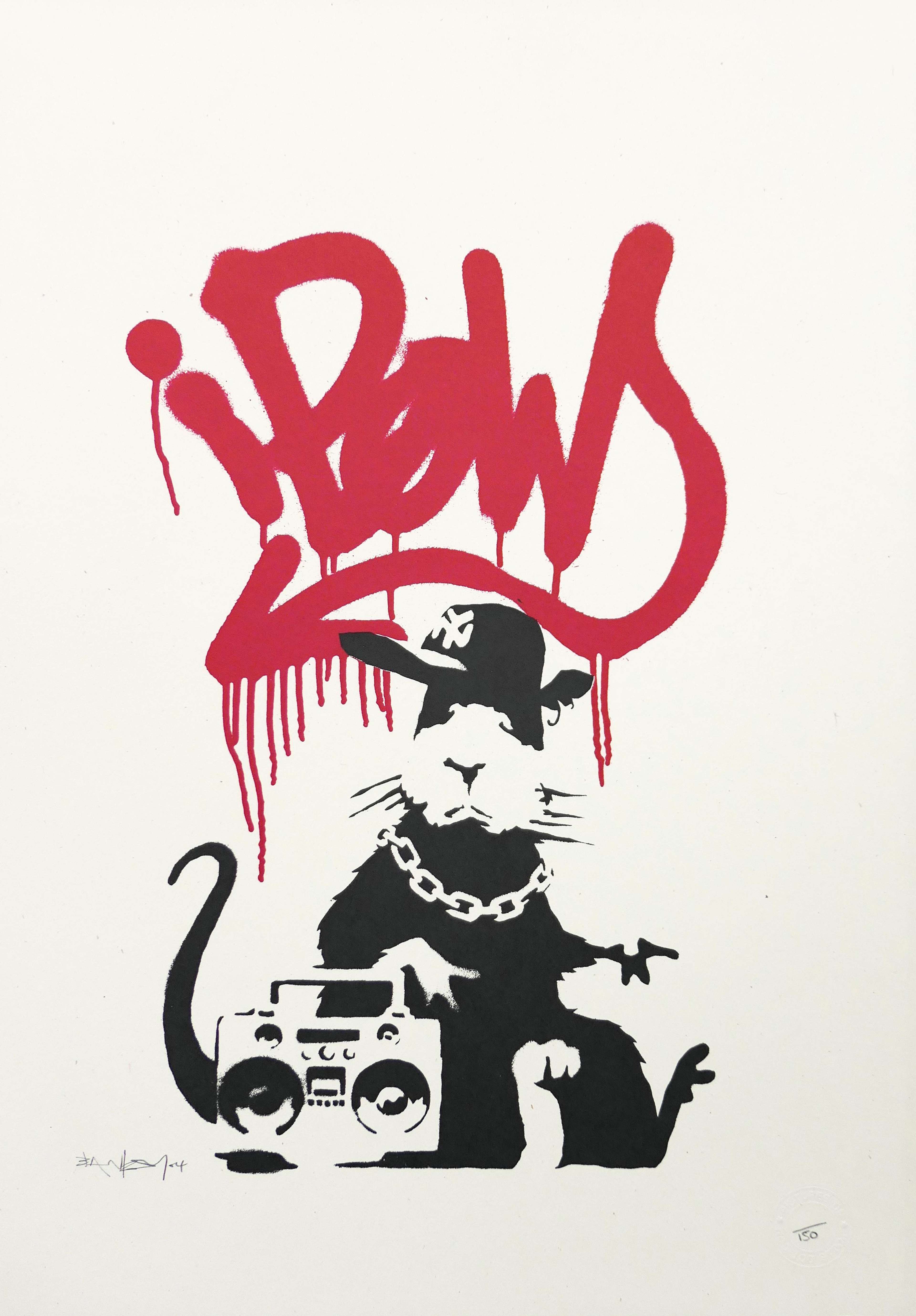 Gangsta Rat © Banksy 2004
Gangsta Rat © Banksy 2004Between 2000-2013, Banksy painted at least 30 rats across London, Europe and New York. Today, his rats have remained popular on the secondary market. An original painting or mural can achieve over half a million pounds at auction, while the top price for a print is currently £149,500, paid for a red colourway of Gangsta Rat in a London auction in December 2020.

